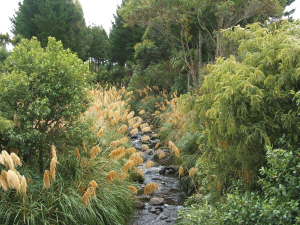Double Standard
OPINION: The proverbial has really hit the fan in Wellington and exposed a glaring example of a double standard in environmental accountability.
 What management needs to be done to ensure riparian strips do not become overloaded and therefore useless?
What management needs to be done to ensure riparian strips do not become overloaded and therefore useless?
Could our riparian systems become overloaded and therefore useless?
Riparian strips are correctly promoted as useful tools for reducing environmental pollution, especially for their ability to filter out faecal bacteria and sediment before these enter streams. But there is much more to it, writes Bert Quin.
Many frequently made claims for the ability of riparian strips to improve water quality are based on very short-term studies only. This is particularly true of phosphorus (P) and nitrogen (N) removal.
Unfortunately, we are now in the days of emphasis on short-term, quick-results trials that lend themselves to publication in many different journals to ensure more cash from equally short-sighted funding organisations and companies with vested interests.
In-depth studies of the longer-term change in effectiveness of riparian strips, development of optimum management plans for them and how to pay for these, are few and far between.
Instead of long-term trials of actual riparian strips, where cause and effect can be clearly assessed, we just monitor river and lake water quality. Reductions in levels are presented by fertiliser industry funded scientists as ‘proof’ that the ‘mitigations’ the authors and funders of the research are promoting are the cause of the reductions. And they are implied to be a permanent fix and supposedly safe for continuing application of high rates of the fertiliser N and soluble P.
Nothing could be further from the truth.
Entry of the ‘big four’ (ie calcium, magnesium, phosphorous and boron) into riparian strips certainly results in less loss direct into the waterways they border. But we have to keep in mind that the quantities of the ‘big four’ being released from intensively grazed pastures are massively greater – typically by one to two orders of magnitude -- than those that enter water from native vegetation.
So the two most important questions should be, what management needs to be done to ensure riparian strips do not become overloaded and therefore useless, and, who should pay for this management?
A promising sign of increasing understanding is a recent article in Dairy News (June 25), sourced from the Waikato Regional Council publication ‘The condition of rural water and soil in Waikato region’. The article repeats the WRC’s advice that riparian strips and drains must be ‘very well maintained’ to be environmentally effective, but neither get into the detail and long-term costs. But the magazine article is poorly headed ‘Plants, fencing keeps nasties out of water’. A far more relevant title would have been ‘Riparian strips and drains must be well maintained to be effective’.
The article states, “In ideal conditions, fenced grass riparian strips can reduce sediment entry to streams by 80%, dissolved P by at least 50% and nitrate-N by at least 60%”. It doesn’t define ‘ideal conditions’ or make any comment on how quickly the P and N loss reductions can diminish.
Let’s look at the effect of different losses, short and long-term, and consider the two ‘elephants in the room’ -- the continuing overuse of fertiliser N and soluble P fertilisers.
To be continued in Dairy News, August 6.
• Bert Quin is the managing director of Quin Environmentals.
Strong farmgate milk price is helping boost investment on farms, says PGG Wrightson chief executive Stephen Guerin.
Fonterra's 460 milk suppliers in Australia, who will switch to Lactalis end of this month, are unfazed with the impending change.
The 5+ A Day Charitable Trust has launched a collection of affordable recipes designed to turn everyday vegetables into seasonal stars.
Jane Mellsopp has been confirmed as the new Government Appointee to the New Zealand Meat Board (NZMB).
To celebrate the tenth anniversary of its annual Good Deeds competition, Rabobank will give away $100,000 to improve rural community hubs, schools, clubrooms, and marae across New Zealand.
Agricultural and veterinary product supplier Shoof International has appointed Michaela Dumper as its new chief executive.
OPINION: Staying with politics, with less than nine months to go before the general elections, there’s confusion in the Labour…
OPINION: Winston Peters' tirade against the free trade deal stitched with India may not be all political posturing by the…